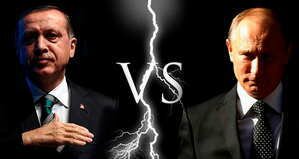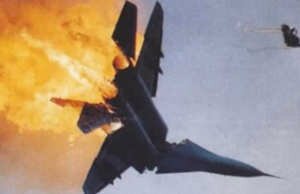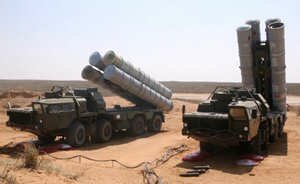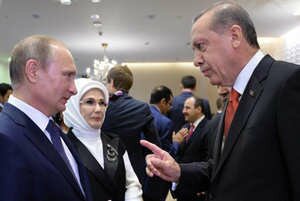
Russia's armed aggression against Ukraine and then Moscow's military intervention into the Syrian conflict have once again demonstrated the cynical and irresponsible policy of the Putin regime, which shamelessly and openly neglects all norms of international law in order to achieve its geopolitical goals.
The Kremlin could not get away with it, as confirmed by the destruction November 24 by the Turkish fighters of the Russian bomber Su-24, which penetrated the airspace of Turkey, despite repeated warnings of the Turkish side on the inadmissibility of such actions.
Despite the seemingly local nature of such an event, it will surely have negative strategic consequences for the Russian Federation.
The Borysfen Intel’s experts, having analyzed the situation around the incident, have made the following conclusions and forecasts:
Firstly — Russia's having nuclear weapons does not guarantee impunity of actions of the current regime of Vladimir Putin. The Kremlin can get away with such actions only against knowingly weaker opponents, but will not remain without respond when Russia opposes a relatively strong enemy, and especially NATO members,
Secondly — the Alliance's response to the incident confirmed the unity of the Alliance and show that it is ready to protect the security of its members. For example, on Turkey's example, the political-military alliance NATO has clearly demonstrated what Moscow should expect if it decides to resort to aggressive actions against the Baltic States or countries of Central and Eastern Europe;
 Thirdly — the destruction by the Turkish Air Force of the Russian combat aircraft in the Turkish airspace is a precedent and an example for other countries that have become subject to Moscow's aggression, including for Ukraine. In this regard, appropriate and adequate was the Secretary of the NSDC of Ukraine O. Turchynov's statement about the readiness of our country to destroy Russian military planes in case they invade Ukrainian airspace;
Thirdly — the destruction by the Turkish Air Force of the Russian combat aircraft in the Turkish airspace is a precedent and an example for other countries that have become subject to Moscow's aggression, including for Ukraine. In this regard, appropriate and adequate was the Secretary of the NSDC of Ukraine O. Turchynov's statement about the readiness of our country to destroy Russian military planes in case they invade Ukrainian airspace;
Fourthly — the audacity of Russia's actions against Turkey and the blatant disregard of its interests, in fact, makes it impossible to implement the Kremlin's plans for cooperation with the USA, EU and their partners (Turkey included) within the framework of the joint fight against Islamic extremism in Syria. In its turn, this completely eliminates Moscow's hopes for lifting of the West's sanctions against Russia. In fact, all Moscow's political dividends (which it received after the terrorist attacks against the Russian passenger plane November 7, 2015, over the Sinai Peninsula, and the Islamic extremists' terrorist attack in Paris on 13 November 2015) have been destroyed.
 Fifthly — Moscow's so-called “adequate” response to the incident in Turkish airspace, including fighter aircrafts' cover for attack aircrafts, and the deployment of air defense systems S-300 (or even S-400) at the Russian military bases in Syria makes no sense. All this won't enhance the security of Russian troops on Syrian territory (due to B. Assad's opponents having no means for air attacks, and because the US and its allies have no aggressive intentions against Russia), but on the contrary — it will significantly increase the threat of the Russian Federation's new clashes with participants of the international anti-terrorist Coalition led by the United States. The only thing that Russians can “try” to do in such circumstances in Syria — is to shoot down a Turkish plane “in response” (combat patrol/striking or even a civilian plane), explaining it with the fact that the aircraft had entered the zone of airspace over the base, where Russian planes are based (the range of C-300/C-400 is from 150 to 400 km or more, depending on the type of a missile).
Fifthly — Moscow's so-called “adequate” response to the incident in Turkish airspace, including fighter aircrafts' cover for attack aircrafts, and the deployment of air defense systems S-300 (or even S-400) at the Russian military bases in Syria makes no sense. All this won't enhance the security of Russian troops on Syrian territory (due to B. Assad's opponents having no means for air attacks, and because the US and its allies have no aggressive intentions against Russia), but on the contrary — it will significantly increase the threat of the Russian Federation's new clashes with participants of the international anti-terrorist Coalition led by the United States. The only thing that Russians can “try” to do in such circumstances in Syria — is to shoot down a Turkish plane “in response” (combat patrol/striking or even a civilian plane), explaining it with the fact that the aircraft had entered the zone of airspace over the base, where Russian planes are based (the range of C-300/C-400 is from 150 to 400 km or more, depending on the type of a missile).
Sixthly — increasing Russia's military presence in Syria objectively leads to a further enmeshing of Moscow into the armed confrontation in the Middle East. This requires from Russia additional expenditures, military and human resources, and can have unpredictable consequences for it in terms of the increasing number of casualties among Russian military servicemen and intensify sabotage and terrorist activities of Islamic extremists in the territory of the Russian Federation;
 Seventhly — Russia's anti-Turkish campaign, which began today, (including a ban on the sale of travel packages to Turkey, the restriction/prohibition of access of Turkish goods to the Russian market, introduction of an embargo on the supply of Russian energy resources and food products to Turkey, as well as “freezing” of the Turkish investment projects in Russia, and so on) without doubt will cause Ankara's real adequate actions, as well as access to the Turkish market of other countries/Turkey's access to other, especially European markets, and in general, will significantly speed up Turkey's Eurointegrational steps. According to recent reports, the EU may introduce visa-free regime for Turkish citizens in the autumn of 2016, and is ready to allocate significant finances for support refugees on Turkish territory (according to different estimates, from three to six billion Euros).
Seventhly — Russia's anti-Turkish campaign, which began today, (including a ban on the sale of travel packages to Turkey, the restriction/prohibition of access of Turkish goods to the Russian market, introduction of an embargo on the supply of Russian energy resources and food products to Turkey, as well as “freezing” of the Turkish investment projects in Russia, and so on) without doubt will cause Ankara's real adequate actions, as well as access to the Turkish market of other countries/Turkey's access to other, especially European markets, and in general, will significantly speed up Turkey's Eurointegrational steps. According to recent reports, the EU may introduce visa-free regime for Turkish citizens in the autumn of 2016, and is ready to allocate significant finances for support refugees on Turkish territory (according to different estimates, from three to six billion Euros).
In particular, such actions could be Turkey's joining the West's sanctions against Russia, its final giving up the implementation of the strategically important for Moscow construction project of the Turkish Stream Gas Pipeline, and introduction of a strict prohibition of Turkish businesses in the Crimea (including the cessation of maritime traffic from Turkey to the Crimean peninsula), etc.
 Besides, in case if Moscow further activates its anti-Turkish policy (especially to promote extremist activities of Kurdish extremists in Turkish territory near the border with Turkey) Turkey may support activity of Islamists of the North Caucasus of the Russian Federation and of the Crimean Tatar population of the Crimea defending their interests before the Russian Federation. The first “swallow” of such a development can be considered President R. Erdogan's words about “...the possibility of expanding the Syrian conflict also onto the Russian territory”.
Besides, in case if Moscow further activates its anti-Turkish policy (especially to promote extremist activities of Kurdish extremists in Turkish territory near the border with Turkey) Turkey may support activity of Islamists of the North Caucasus of the Russian Federation and of the Crimean Tatar population of the Crimea defending their interests before the Russian Federation. The first “swallow” of such a development can be considered President R. Erdogan's words about “...the possibility of expanding the Syrian conflict also onto the Russian territory”.
So, the already traditional for Russia aggressive foreign policy, as well as disregard of its potential partners instead of constructive cooperation with them — once again give a crushing blow to the Russian Federation itself.
The consequence of such a blow have become the increasing international isolation of Russia, Moscow's losing possible exit from the political and economic crisis, growing of the threat of Islamic extremism to it. That is how the Russian people are paying for V. Putin's regime's irresponsibility and madness.

